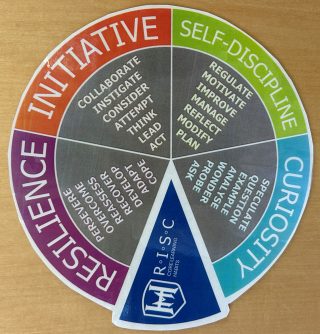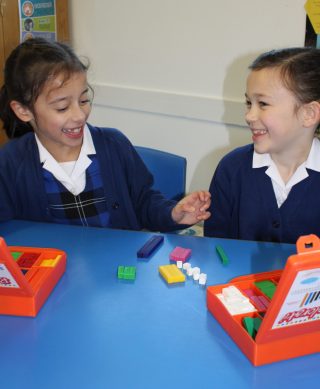Core Learning Habits
Our curriculum is designed to enable every pupil to experience a breadth of educational opportunities as well as engaging, inspiring and challenging them in their learning. Each girl is encouraged to embrace new learning opportunities and challenging activities.
We aim is to develop independent learners who are ambitious, hard-working and confident and who begin a lifelong love of learning. To this end, we have identified four key learning habits (dispositions) – Resilience, Initiative, Self-Discipline and Curiosity – which form part of our new, R.I.S.C. wheel and are all firmly embedded within our curriculum. The habits within the wheel support one another and we believe that by developing and strengthening these habits/dispositions in our girls, we are preparing them for their future learning. We want our pupils to take a risk with their learning and not fear the unknown or getting things wrong. New learning can be hard, but is can also be exciting, stimulating and rewarding.
Resilience
Being resilient gives children the ability to tackle new experiences and challenges head-on, bounce back from any setbacks and have the best chance at succeeding. It allows them to learn and grow in all situations – two skills that are crucial to wellbeing and development.
Resilience will also help them to approach new situations, people or experiences with confidence and a positive mindset, which will make them more likely to succeed. We want to prepare our children for the road ahead rather than trying to smooth the road ahead for them.
Initiative
It is essential for young children to develop initiative as it helps them become more independent and self-motivated. When children have initiative, they are more likely to take on new tasks and challenges, which can help them learn and grow. Taking initiative demonstrates confidence, high self-esteem and a willingness to work hard.
Self-discipline
Many recent studies by psychologists have shown that there is a correlation between self-discipline and academic success. Students with a high degree of self-discipline retain more knowledge than those without self-discipline. Additionally, researchers discovered that students with strong self-discipline are more careful in their tasks, which improves their performance.
Curiosity
This is essential for learning because it motivates learners to explore new information and ideas. When students are curious, they are more engaged in the learning process.
Curiosity also prepares learners for the challenges of daily life. In a constantly changing world, curious and adaptable learners are better equipped to handle new situations and solve problems creatively.
Studies have shown that when students are curious, they are more likely to remember what they have learned, and to apply that knowledge to new situations. This is because curiosity helps to stimulate the brain, creating new neural connections and strengthening existing ones.

